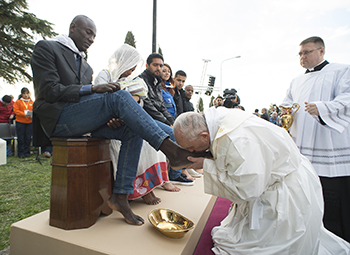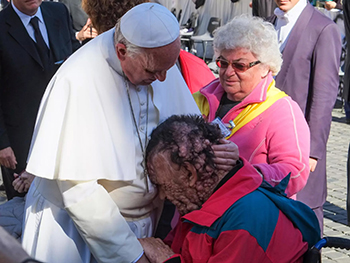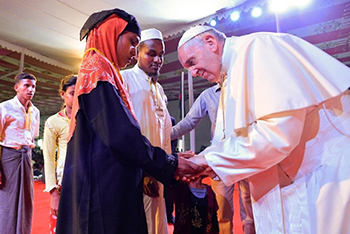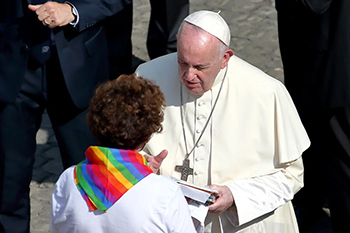From Our Archives
Michael Fitzpatrick, The Home of God is Among Mortals (2022); Debie Thomas, If You Love (2019); Dan Clendenin, The Day of Non-Judgment is Near (2016); and "To Carry the Candle Against the Wind" (2013).
This Week's Essay
Acts 11:1, "Even the Gentiles received the word of God!"
For Sunday May 18, 2025
Lectionary Readings (Revised Common Lectionary, Year C)
Psalm 148
Revelation 21:1–6
John 13:31–45
When Pope Francis died on April 21, he left a legacy that will keep historians busy for years. Some conservatives complained that he went too far too fast, while some liberals lamented that he did too little too late. He was more of a pastor than an institutionalist. But one thing seems clear — in word, deed, and in prayer, Pope Francis worked hard for a more inclusive church. We'll see what happens with the newly appointed Leo XIV.
The "beloved physician" Luke is the only Gentile to write a book of the Bible. His "Acts of the Apostles" starts in Jerusalem and ends in Rome. He describes how a tiny and fearful sect of Jews huddled behind closed doors in their sacred city became a vibrant movement in the capital of one the greatest empires in history. Luke's final sentence in Acts 28:31 describes how Paul, under house arrest, preached the good news of God's love "boldly and without hindrance" for two years in Rome.
This is a story of expansion and inclusion on steroids, though not without difficulties and opposition from both inside and outside the nascent Jesus movement.
Acts 11 for this week marks a transition in Luke's story, where he ends one section and begins another. He pivots from Paul's conversion on the road to Damascus in Acts 9 to Peter's conversion in the house of Simon the tanner in Acts 10–11.
The story of Peter and Cornelius begins with a tiny detail that Luke repeats three times.
 |
|
Asylum seekers: "We are all children of the same God.”
|
Luke says that "Peter stayed in Joppa for some time with a tanner named Simon." A few sentences later, he repeats himself: "Send men to Joppa to bring back a man named Peter, who's staying with Simon the tanner." And then again, one page later: "Send to Joppa for Simon who is called Peter. He is a guest in the home of Simon the tanner."
Simon the tanner was a socio-economic outcast. He was a "dirty" man both literally and figuratively. Tanners worked with dead animals. The filth and the stench were awful. Imagine how Simon looked and smelled at the end of a hot day. He would have been the object of social disdain. Almost everyone would have felt superior to him.
But Simon the tanner had joined the Jesus movement. He found acceptance there that society never gave him. And so Simon the Gentile tanner hosted Simon the Jewish apostle. It's a fascinating snap shot of how the Jesus movement spread like wild fire among down market outcasts. I'm left wondering just how and why Peter ended up in such an unlikely room-n-board.
Given our propensity to justify ourselves and to scape goat others, the Jewish purity laws lent themselves to a moral hierarchy between the ritually "clean" who considered themselves to be close to God, and the "unclean" who were shunned as "dirty" sinners who were far from God.
Instead of expressing the holiness of God, ritual purity became a means of excluding people who were considered polluted or contaminated. Jesus rejected such ritual purity as a measure of one's spiritual status.
In a marvelous stroke of irony, Luke says that it's in the home of Simon the tanner, a Gentile who handled animal carcasses every day, where Peter the conscientious Jew had his vision — surprise! — of unclean animals. Peter learned that even though purity laws forbid him to associate with Gentiles, especially one as "dirty" as Simon or as suspect as a Roman soldier like Cornelius, and even though he bragged about never doing anything "unclean," God showed him that "I should not call any person impure or unclean. I now realize how true it is that God does not show favoritism."
 |
|
Blessing Vinicio Riva
|
And so the tiny Jewish sect of Jesus followers embraced and then exploded amongst the Gentiles. Radical inclusion subverted religious exclusion.
Unfortunately, this story has a cautionary footnote in the book of Galatians. After his "Cornelius conversion" and repudiation of exclusion in Acts 10-11, Peter the Jew did something radical — he ate with the Gentiles. But in Galatians Paul describes how Peter later regressed into gross hypocrisy.
In Galatians, Paul says that "certain men came from James" — that is, Jewish leaders of the Jerusalem church who insisted that Gentile converts had to obey the Jewish law. Peter succumbed to their demands and "began to separate himself from the Gentiles." Even worse, there was a domino effect when other believers followed Peter's hypocrisy, even the beloved Barnabas.
Paul used the harshest language to repudiate those who had narrowed the gospel down to a Jewish sect. His gospel was about expanding the message to include Gentiles and all the world. And so, "when Peter came to Antioch, I opposed him to his face." "We didn't give in for a moment." Just try to imagine that public confrontation between Peter and Paul!
This is why Paul said that in serving God he didn't seek human approval. If you want human approval, you privilege your own In Group over every Out Group. You limit God's love to your own tribe, and claim to be the sole inheritor of the divine promise. But when you insist that God loves people who are outside of your group — and the "dirty" Gentiles were, by definition, "unclean" for ritually pure Jews, then you incur human wrath, for you've betrayed the cause and transgressed the carefully drawn boundaries.
It took a while, but Paul eventually won this argument. Henceforth, no longer would the good news of God's love be limited to an exclusive few. Rather, it became an inclusive message for all the world, and so, instead of remaining a Jewish sect, "Christianity" became a global religion.
The "perverted gospel" that Paul "anathematizes" in Galatians is one that restricts, narrows, or limits the love of God to an exclusive few — in his time and place, those believers who wanted to force Gentiles to live like Jews.
 |
|
Rohingya Muslims in Dhaka.
|
The "true gospel" that Paul defends is one that expands the love of God to all people without exception and subverts our moral hierarchies. In Galatians, Paul says that his gospel bursts our normal boundaries of exclusion, like race, religion, gender, and class — "There is neither Jew nor Greek, slave nor free, male nor female, for you are all one in Christ."
Later still, in another tragic reversal, Gentile Christians would turn their wrath and rage against unbelieving Jews in violent anti-semitism.
Extending mercy to all, and judgment to none, was central to the ministry of Pope Francis. Back on December 8, 2015, he announced the beginning of an "extraordinary" Holy Year of Mercy.
Francis began the Holy Year of Mercy with a symbolic ritual — knocking on the massive bronze doors of the Basilica of St. Peter, and then walking through them. Whereas the door is usually sealed, in 2016 over 20 million pilgrims walked through that door. My wife and I did exactly that.
The summer of 2016, we walked the 330-mile Way of Saint Francis in Italy. It was our third pilgrimage. In 2012, we walked the 493-mile Camino Santiago in northern Spain. In 2014, we did the 458-mile pilgrimage across southern France called Le Chemin du Puy.
Our version of the Via Francigena began in Florence, curled around clockwise to Assisi, then continued in a backwards "C" to Rome. In Rome, we walked through those "doors of mercy."
The symbolic significance? "I am the door," said Jesus in John 10:7. And so Francis prayed, “You are the door through which we come to thee, inexhaustible source of consolation for everyone.”
“To pass through the Holy Door," said Pope Francis in his homily, "means to rediscover the infinite mercy of the father who welcomes everyone and goes out personally to encounter each of them.”
 |
|
"Who am I to judge?"
|
"How much wrong we do to God and his grace when we affirm that sins are punished by his judgment before putting first that they are forgiven by his mercy!"
"It is truly so," said Francis, paraphrasing James 2:13: "We have to put mercy before judgment, and in every case God’s judgment will always be in the light of his mercy."
In his homily, Pope Francis put it this way: "You cannot conceive of a true Christian who is not merciful, just as you cannot conceive of God without his mercy. Mercy is the key word of the Gospel… We should not be afraid: We should allow ourselves to be embraced by the mercy of God, who waits for us and forgives everything.”
Weekly Prayer
Walter Brueggemann (b. 1933)
Dreams and Nightmares
On reading 1 Kings 3:5-9; 9:2-9Last night as I lay sleeping,
I had a dream so fair . . .
I dreamed of the Holy City, well ordered and just.
I dreamed of a garden of paradise,
well-being all around and a good water supply.
I dreamed of disarmament and forgiveness,
and caring embrace for all those in need.
I dreamed of a coming time when death is no more.Last night as I lay sleeping . . .
I had a nightmare of sins unforgiven.
I had a nightmare of land mines still exploding
and maimed children.
I had a nightmare of the poor left unloved,
of the homeless left unnoticed,
of the dead left ungrieved.
I had a nightmare of quarrels and rages
and wars great and small.When I awoke, I found you still to be God,
presiding over the day and night
with serene sovereignty,
for dark and light are both alike to you.At the break of day we submit to you
our best dreams
and our worst nightmares,
asking that your healing mercy should override threats,
that your goodness will make our
nightmares less toxic
and our dreams more real.Thank you for visiting us with newness
that overrides what is old and deathly among us.
Come among us this day; dream us toward
health and peace,
we pray in the real name of Jesus
who exposes our fantasies.Walter Brueggemann (b. 1933) has combined the best of critical scholarship with love for the local church. Now a professor emeritus of Old Testament studies at Columbia Theological Seminary in Decatur, Georgia, Brueggemann has authored over seventy books. Taken from his Prayers for a Privileged People (Nashville: Abingdon, 2008), pp. 79–80.
Dan Clendenin: dan@journeywithjesus.net
Image credits: (1) America: The Jesuit Review; (2) Delaware Public Media; and (3) Catholic News Agency; and (4) NBC News.





